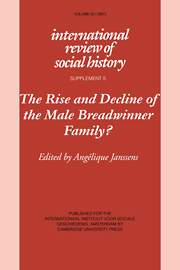 The Rise and Decline of the Male Breadwinner Family?
The Rise and Decline of the Male Breadwinner Family? Book contents
- Frontmatter
- Contents
- NOTES ON CONTRIBUTORS
- 1 The Rise and Decline of the Male Breadwinner Family? An Overview of the Debate
- 2 The Origins and Expansion of the Male Breadwinner Family: The Case of Nineteenth-Century Britain
- 3 Gendered Exclusion: Domesticity and Dependence in Bengal
- 4 Breadwinning Patterns and Family Exogenous Factors: Workers at the Tobacco Factory of Seville during the Industrialization Process, 1887–1945
- 5 Family, Work and Wages: The Stéphanois Region of France, 1840–1914
- 6 Welfare State Attitudes to the Male Breadwinning System: The United States and Sweden in Comparative Perspective
- 7 Comparing the Post-War Germanies: Breadwinner Ideology and Women's Employment in the Divided Nation, 1948–1970
- Notes On Contributors
2 - The Origins and Expansion of the Male Breadwinner Family: The Case of Nineteenth-Century Britain
Published online by Cambridge University Press: 04 August 2010
- Frontmatter
- Contents
- NOTES ON CONTRIBUTORS
- 1 The Rise and Decline of the Male Breadwinner Family? An Overview of the Debate
- 2 The Origins and Expansion of the Male Breadwinner Family: The Case of Nineteenth-Century Britain
- 3 Gendered Exclusion: Domesticity and Dependence in Bengal
- 4 Breadwinning Patterns and Family Exogenous Factors: Workers at the Tobacco Factory of Seville during the Industrialization Process, 1887–1945
- 5 Family, Work and Wages: The Stéphanois Region of France, 1840–1914
- 6 Welfare State Attitudes to the Male Breadwinning System: The United States and Sweden in Comparative Perspective
- 7 Comparing the Post-War Germanies: Breadwinner Ideology and Women's Employment in the Divided Nation, 1948–1970
- Notes On Contributors
Summary
INTRODUCTION
The transition from a family economy in which incomes were democratically secured through the best efforts of all family members to one in which men supported dependent wives and children appears as a watershed in many otherwise very different histories of the family. It looms large in both orthodox economic analyses of historical trends in female participation rates and feminist depictions of a symbiotic structural relationship between inherited patriarchal relationships and nascent industrial capitalism. Both camps agree, as Creighton has recently put it, about “the outlines of [the] development” of the male breadwinner family. Where they disagree is in “the factors responsible for its origins and expansion”. Why did families move away from an asserted “golden age” of egalitarian sourcing of incomes, which involved husbands, wives and children, to dependence on a male breadwinner who aspired to a family wage? Neoclassical economic historians emphasize the supply conditions, concentrating on income effects from men's earnings, family structure variables and alternatives to women's employment in terms of productive activities in the home. In contrast, dual systems theorists emphasize demand conditions in terms of institutional constraints on women's and children's employment exemplified by the exclusionary strategies of chauvinist trade unions, labour legislation which limited the opportunities of women and children, and the legitimation of men's wage demands by references to their need for a family wage.
- Type
- Chapter
- Information
- The Rise and Decline of the Male Breadwinner Family?Studies in Gendered Patterns of Labour Division and Household Organisation, pp. 25 - 64Publisher: Cambridge University PressPrint publication year: 1998
- 2
- Cited by


